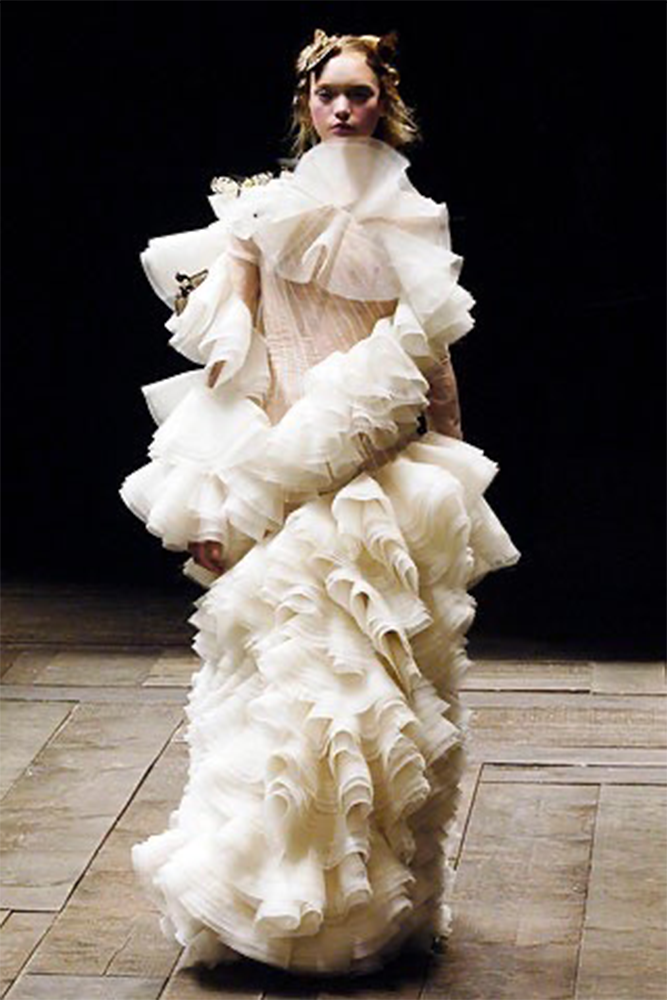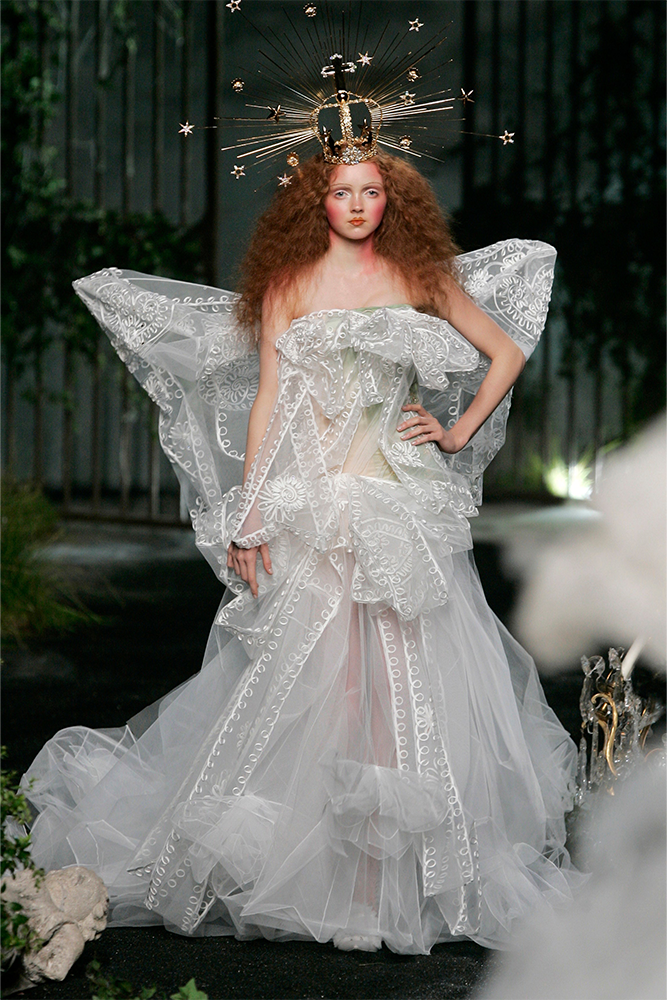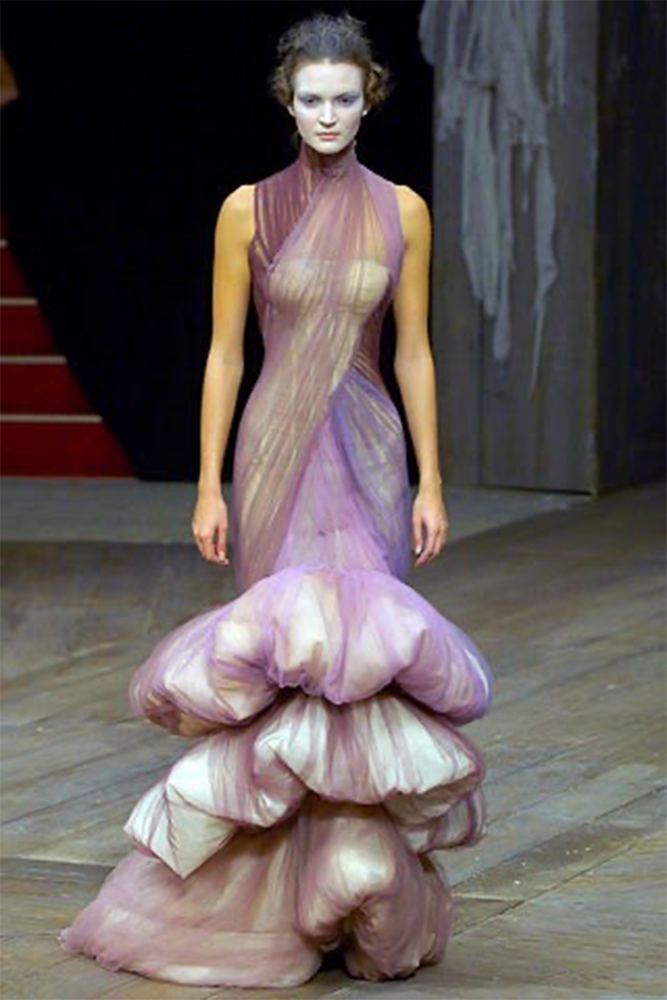Dana Thomas
Gods and Kings

‘Not everybody reads poetry or listens to music, but every single person in the world gets up in the morning and puts on something, and whether you like it or not, that’s a statement about who you are.’
I absolutely adore this book! I found it so difficult to put down. I’ve been meaning to read it for a while but I went on a little trip and it was a perfect holiday read. Thomas intertwines Galliano and McQueen’s lives really well whilst keeping a certain separation. There’s a really good balance between their work and the complicated relationship they had with themselves and those around them. Their lives feel like fiction in some weird way. A distance from reality that characterised a large part of their careers. Kings in their own right, but all kings have to eventually answer to the Gods.
They’ve both produced so much beautiful work, and Galliano continues to do so at Margiela, however it is a shame how things turned out, especially for McQueen. It does feel like a sad read for the most part. They both battled demons, however accountability can often be felt in the most extreme ways.

Alexander McQueen
S/S 2001
S/S 2001

Alexander McQueen
A/W 1995
A/W 1995

Alexander McQueen
A/W 2006
A/W 2006
I.
I definitely have more of a soft spot towards McQueen and his unconventional path towards the top of fashion. The harsh realism of his collections is something I’ve always resonated more towards. The ability to translate ideas through the medium of clothes is something I admire about both Galliano and McQueen. McQueen’s mix of thematic and autobiographical work feels rooted in something that you can never really escape from: yourself. All art is some kind of representation of the self, but you can try to turn a blind eye or you can face it head on.
McQueen’s outspoken but relentless nature was an entertaining part of the book. It’s refreshing to hear him openly speak about the industry as a whole. Given how incestuous it is, it’s becoming rarer for prominent figures and critics to share their authentic opinions.
‘So fucking typical of the government! They do nothing to help you when you’re trying to do something, then take credit when you’re a success! Fuck off!’
The elevation of his career is quite astonishing, given his background, though fully deserved. However, sacrifice was something he had to continually face, regardless of whether he knew it or not. It’s a shame how McQueen was treated at Givenchy, though I’m glad he was able to put a lot of that back into his namesake label, acquiring the resources necessary to execute his ideas at the highest level, despite being something that wasn’t going to last.
The autobiographical element of his work is also really interesting and I guess something that inevitably was overlooked at the time. It’s probably impossible to fully understand how you relate things to your own life, even for the artist themselves. From the distorted realism of McQueen’s work to the historical fantasy worlds of Galliano, the personal element often reveals itself, whether they like it or not.

Alexander McQueen
A/W 2006
A/W 2006

Alexander McQueen
A/W 2000
A/W 2000

Alexander McQueen
S/S 2008
S/S 2008
II.
Galliano is much harder to sympathise with than McQueen. His reflections on the incident seem somewhat dismissive and don’t really address it properly. It’s obviously a confusing situation but it comes across as if he thinks it was a bad dream, something that he feels his true self would never do, despite his history of arrogance.
Galliano and McQueen are no doubt geniuses in their own right, however it’s sad to see both of their stories play out. I’m a fan of Galliano’s work at Margiela, though it’s a shame how things played out at Dior and that he couldn’t sustain himself there. I’ve never paid too much attention to Dior but its current state is rather lacklustre and boring, the theme of many large fashion houses, and the complete opposite of Galliano.
The worlds Galliano creates are really incredible and something I admire most about his work. World building, when done well, is amazing to experience in any medium. His couture can surely be appreciated even if you have no interest in fashion. Despite some controversial collections, his work at Dior was always exciting.
The compartmentalisation of his life was an interesting theme throughout the book as well. It made me think about the ways I compartmentalise my own life. Lots of little worlds that don’t really collide and attempting to keep it that way. Obviously as years go by your worlds inevitably blend in some way. It makes me wonder that maybe the only reason you’d compartmentalise to a strict degree is purely out of insecurity. Being so aware but not being aware at all.

Christian Dior
A/W 2000 Couture
A/W 2000 Couture

Christian Dior
A/W 2005 Couture
A/W 2005 Couture

John Galliano
S/S 1993 RTW
S/S 1993 RTW
III.
I think the book does well to highlight both Galliano and McQueen’s inadequacies whilst not making excuses for their behaviour. They clearly had a lack of regard for those who did so much for them. They were obviously going through a lot but being in a ‘bad place’ is never a justification for acting and treating people the way they did.
There is sympathy for the holes they were pushed into and watching people close to us lose a sense of agency is always sad to witness. Destructive behaviour is always tough to deal with especially when it’s someone you love. But sometimes there’s nothing you can do and that’s one of the hardest things to deal with as a human. Knowing that your actions can only do so much for a person.

Christian Dior
A/W 2005 Couture
A/W 2005 Couture

Christian Dior
A/W 2001 RTW
A/W 2001 RTW

Christian Dior
S/S 1999 Couture
S/S 1999 Couture
IV.
The rampant commercialisation of fashion also coincided with the careers of Galliano and McQueen, which was something they helped to build, conscious of it or not. Of course fashion is now run by an incestuous melting pot of monopolistic conglomerates who dominate the business, retail and media landscape.
The industry has become more homogenous and growth-oriented than ever. The influence these ‘Gods’ have, such as Bernard Arnault, is sort of unprecedented in fashion and has arguably been a force for evil ever since. The world of fashion has changed so much in the last half century and both Galliano and McQueen were two designers who were at the forefront of developing its modern iteration. Arguably they were merely puppets, especially when at Givenchy and Dior. The demands of the Gods eventually running them into the ground.
The establishment is brutal and will continue to be so. Fashion seems to be the worst in the arts industry for its cut throat nature due to its scale, though most others have followed suit. These conglomerates place threads on the shoulders of creative directors, where the lines become blurred between what the work actually represents.
The fashion landscape seems to be getting continuously worse, although there are obviously many pockets of light that exist. However, it does seem that the largest luxury brands, despite having a wider audience, have lost value. Many have definitely lost their original customer bases and quality has been on the decline despite increasing prices. You really wonder how long they can hold onto this model in a world of passive consumption, trends and virality. The nature of how they operate seems fleeting, though it’s not going away anytime soon.

Alexander McQueen
S/S 1998
S/S 1998

Alexander McQueen
S/S 1997
S/S 1997

Alexander McQueen
S/S 2007
S/S 2007
V.
This is a book that I feel like you could enjoy even if you aren’t into fashion. Legacies tend to be defined by the media and Thomas preserves both Galliano and McQueen’s careers in a sincere way. Their problematic nature epitomises the issues with the fashion industry, most of which continue to plague the industry today. They are beacons of the highest of highs and the lowest of the lows.
The Gods continue to prevail whilst monarchies have continued to crumble. Conversations of sustainability, both for clothes and the people making them, seem to dissipate as quickly as the words are uttered. We are living in a world that Galliano and McQueen built for the Gods. The conglomerates seem indestructible, though one would hope they’ll eventually become a product of their own destruction. Although they will always find a way to squeeze money out of any pocket they find. If profit declines, there’s always another puppet to exploit.
Things change but nothing changes at all.